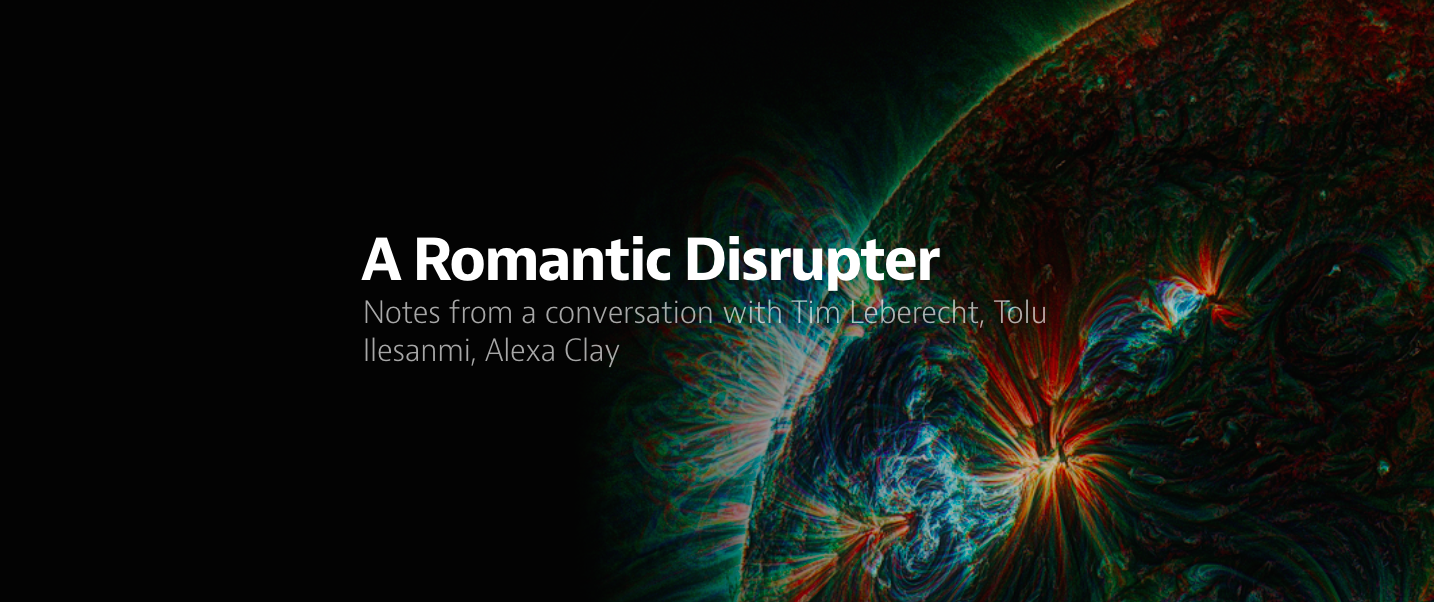A Romantic Disrupter
Notes from a conversation with Tim Leberecht, Tolu Ilesanmi, Alexa Clay

Yesterday, I had the pleasure of joining Alexa Clay, Tolulope Ilesanmi, andTim Leberecht for a panel discussion at HUGE Inc.
Tim had invited us to discuss our experiences as business romantics, an identity he explores and promotes in his recent book by the same name. Here are a few ideas and shared stories I took away from our conversation.
- Put on rose colored glasses and fake it. We can give ourselves permission to lose control over whatever identities, roles, or world-views dominate our thinking and feeling. Taking on the mindset of a business romantic is not about permanence. It’s okay to establish practices that momentarily break the routines we have established in order to access another part of who we are and gain a fresh perspective on a challenge or opportunity. Live action role playing (LARP’ing) can help us play, suspend disbelief, and reimagine the value of faking it until we make it.
- The world needs more cleaners. Despite the dynamism and movement generated by the fast-paced world of modern corporate life, many cobwebs still exist. Cleaners must cultivate a romantic mindset to see future potential and order in current stagnation and messiness. Cleaners don’t just remove dirt, they show care, demonstrate responsibility, take ownership over a given situation, space, reality. In some cases, we have created work environments that discourage us from composting our market place of acceptable identities, ideas, and products. The practice of cleaning — materially and mentally — can help us confront our given situations and stop sweeping unsavory realities under the rug.
- Romantics suffer and that’s not necessarily a bad thing. Loving what you do is a coin flip away from hating what you do. Some of the most romantic personalities belonged to some of the most tortured people. As Tim shares, business romantics long for moments of excitement and adventure, adversity and drama. A person can work for a fantastic company with a fantastic mission to make the world a better place and be utterly bored, untested, relaxed and settled in a nicely decorated, but deeply unsatisfying rut. It’s okay to acknowledge and share our longing for vulnerability and risk. If we are open about these feelings and dissatisfactions, we can discover positive ways to channel our darker romantic impulses.
- The underdog relies on spiritual, not material advantage. Business romantics can be underdogs that pull through in the end because of a surplus of fighting spirit and a bit of luck. For better and worse, they rally others to establish a tone through developing entourages and rituals of being. They can dominate by having a brighter vision than their colleagues or subordinates. They might sacrifice title in order to make a point about meaning, or sacrifice their product to protect the cultural integrity of whatever they are trying to promote or sell. They might momentarily sacrifice their identity to try out another way of being in the world. Anchoring it all is a strong sense of spirit that drives what might otherwise seem like reckless, unbridled risk taking. The business romantic is not driven by a need for risk, but driven by a fear of a world where risk in the pursuit of something grander isn’t available.
If you haven’t checked out Tim Leberecht’s The Business Romantic: Give Everything, Quantify Nothing, and Create Something Greater Than Yourself, grab a copy here.
Order your licit illicit copy of the forthcoming Misfit Economy: Lessons in Creativity from Pirates, Hackers, Gangsters and Other Informal Entrepreneursby Alexa Clay and Kyra Maya Philips.
Check out Tolu Ilesanmi’s Zenith Cleaners and reflect on how the identity of the cleaner can change your work-view.
Does this post strike a cord? Give it some sugah! Hit the recommend button below so we can spread the word about business romanticism and include more voices in the conversation.
This post first appeared on Medium.